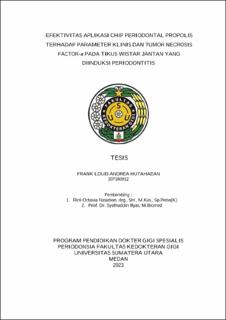Efektivitas Aplikasi Chip Periodontal Propolis terhadap Parameter Klinis dan Tumor Necrosis Factor-α pada Tikus Wistar Jantan yang Diinduksi Periodontitis
Application on Clinical Parameters and Tumor Necrosis Factor-a in Male Wistar Rats Induced By Periodontitis

Date
2023Author
Hutahaean, Frank Louis Andrea
Advisor(s)
Nasution, Rini Octavia
Ilyas, Syafruddin
Metadata
Show full item recordAbstract
Background: Scaling and root planing (SRP) is a non-surgical treatment that is the gold standard in the treatment of periodontal disease. This mechanical debridement has limitations such as the inability to reach deep pockets and furcations so that additional antimicrobial therapy is needed to eliminate or reduce the number of pathogenic bacteria. Objective: To analyze the effectiveness of the application of propolis periodontal chips in Wistar rats with induced periodontitis as a support for initial therapy on clinical parameters and TNF-α expression. Methods: Laboratory experimental research with posttest control group design: 45 male Wistar rats with induced periodontitis were divided into five treatment groups (placebo periodontal chip application, chlorhexidine 2.5 mg and propolis 2.5%, 5%, 10%). Examination of clinical parameters and TNF-α expression was carried out on days 0, 3, and 7 after treatment in mice. Results: The results of this study showed that the improvement in gingival index was significant on day 3, while the improvement in pocket depth and clinical attachment loss on days 3 and 7 was significant as well as a decrease in TNF-α expression on day 7 after treatment with significantly significant results. statistics (p<0.05) whereas between treatment groups there was no statistically significant difference so that the 2.5% propolis periodontal chip was effective as a support for initial therapy. Conclusion: Application of propolis periodontal chips can improve gingival index and pocket depth, level of clinical attachment loss and reduce TNF-α expression significantly.
Collections
- Master Theses [39]
